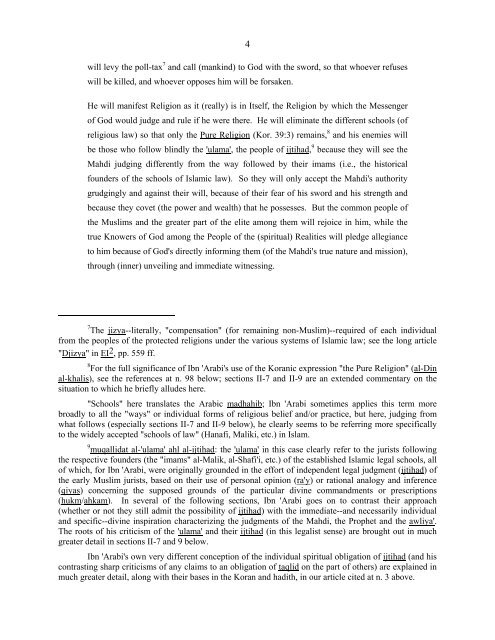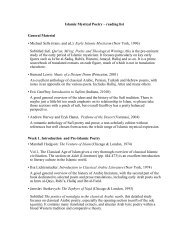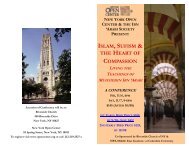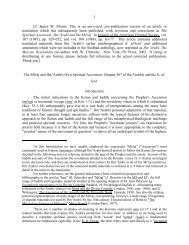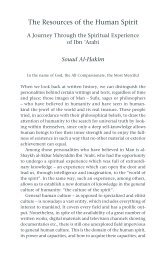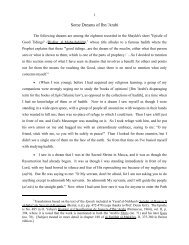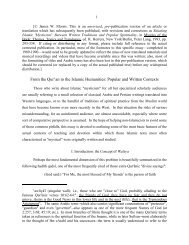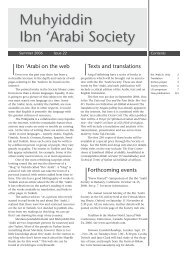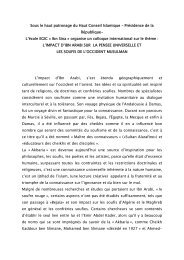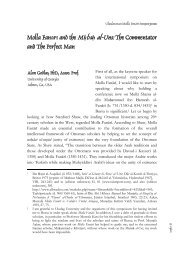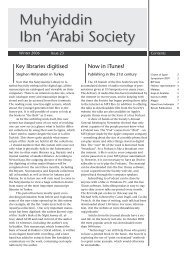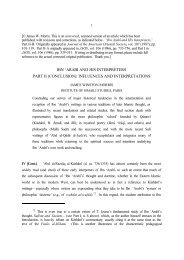The Mahdi and His Helpers - Muhyiddin Ibn Arabi Society
The Mahdi and His Helpers - Muhyiddin Ibn Arabi Society
The Mahdi and His Helpers - Muhyiddin Ibn Arabi Society
You also want an ePaper? Increase the reach of your titles
YUMPU automatically turns print PDFs into web optimized ePapers that Google loves.
4will levy the poll-tax 7 <strong>and</strong> call (mankind) to God with the sword, so that whoever refuseswill be killed, <strong>and</strong> whoever opposes him will be forsaken.He will manifest Religion as it (really) is in Itself, the Religion by which the Messengerof God would judge <strong>and</strong> rule if he were there. He will eliminate the different schools (ofreligious law) so that only the Pure Religion (Kor. 39:3) remains, 8 <strong>and</strong> his enemies willbe those who follow blindly the 'ulama', the people of ijtihad, 9 because they will see the<strong>Mahdi</strong> judging differently from the way followed by their imams (i.e., the historicalfounders of the schools of Islamic law). So they will only accept the <strong>Mahdi</strong>'s authoritygrudgingly <strong>and</strong> against their will, because of their fear of his sword <strong>and</strong> his strength <strong>and</strong>because they covet (the power <strong>and</strong> wealth) that he possesses. But the common people ofthe Muslims <strong>and</strong> the greater part of the elite among them will rejoice in him, while thetrue Knowers of God among the People of the (spiritual) Realities will pledge allegianceto him because of God's directly informing them (of the <strong>Mahdi</strong>'s true nature <strong>and</strong> mission),through (inner) unveiling <strong>and</strong> immediate witnessing.7 <strong>The</strong> jizya--literally, "compensation" (for remaining non-Muslim)--required of each individualfrom the peoples of the protected religions under the various systems of Islamic law; see the long article"Djizya" in EI 2 , pp. 559 ff.8 For the full significance of <strong>Ibn</strong> '<strong>Arabi</strong>'s use of the Koranic expression "the Pure Religion" (al-Dinal-khalis), see the references at n. 98 below; sections II-7 <strong>and</strong> II-9 are an extended commentary on thesituation to which he briefly alludes here."Schools" here translates the <strong>Arabi</strong>c madhahib; <strong>Ibn</strong> '<strong>Arabi</strong> sometimes applies this term morebroadly to all the "ways" or individual forms of religious belief <strong>and</strong>/or practice, but here, judging fromwhat follows (especially sections II-7 <strong>and</strong> II-9 below), he clearly seems to be referring more specificallyto the widely accepted "schools of law" (Hanafi, Maliki, etc.) in Islam.9 muqallidat al-'ulama' ahl al-ijtihad: the 'ulama' in this case clearly refer to the jurists followingthe respective founders (the "imams" al-Malik, al-Shafi'i, etc.) of the established Islamic legal schools, allof which, for <strong>Ibn</strong> '<strong>Arabi</strong>, were originally grounded in the effort of independent legal judgment (ijtihad) ofthe early Muslim jurists, based on their use of personal opinion (ra'y) or rational analogy <strong>and</strong> inference(qiyas) concerning the supposed grounds of the particular divine comm<strong>and</strong>ments or prescriptions(hukm/ahkam). In several of the following sections, <strong>Ibn</strong> '<strong>Arabi</strong> goes on to contrast their approach(whether or not they still admit the possibility of ijtihad) with the immediate--<strong>and</strong> necessarily individual<strong>and</strong> specific--divine inspiration characterizing the judgments of the <strong>Mahdi</strong>, the Prophet <strong>and</strong> the awliya'.<strong>The</strong> roots of his criticism of the 'ulama' <strong>and</strong> their ijtihad (in this legalist sense) are brought out in muchgreater detail in sections II-7 <strong>and</strong> 9 below.<strong>Ibn</strong> '<strong>Arabi</strong>'s own very different conception of the individual spiritual obligation of ijtihad (<strong>and</strong> hiscontrasting sharp criticisms of any claims to an obligation of taqlid on the part of others) are explained inmuch greater detail, along with their bases in the Koran <strong>and</strong> hadith, in our article cited at n. 3 above.


